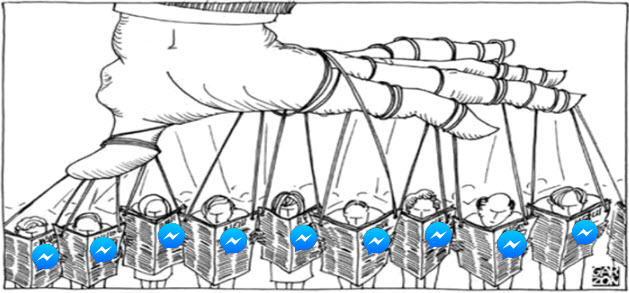
Let’s face it – listening to the talking points from some corporate mouthpiece is usually torture. Except, on incredibly rare occasions, the mouthpiece may let something of substance slip through. Consider this statement from David Marcus of Facebook Messenger in a recent CNBC interview.
“What we think about is there’s a conversation, and inside of that conversation, you have a canonical, contextual place where you can have all of the interactions you can have or need to have with a brand or a service and it can take multiple forms.”
Sounds like corporate-speak garbage, you say? Surprisingly, it’s not.
If you take the time to decode it, it’s very succinct glimpse into the mind of the man running Facebook Messenger. And what he sees is a Messenger-centric world where businesses and consumers conduct ALL OF THEIR CONVERSATIONS AND INTERACTIONS:
“You have a canonical, contextual place where you can have all of the interactions you can have or need to have with a brand or service.”
That’s the 5-year product roadmap for Facebook Messenger in one sentence.
Marcus calls Messenger the “canonical”, meaning that it is the single place, the single system of record most appropriate to these conversations.
He calls it “contextual” because Facebook has your identity, and “remembers” all kinds of information about you and your past interactions with this brand or service, providing the context for your conversation. And to the extent that Messenger remembers everything about your commerce history, that’s pretty powerful memory.
I’ve gone on at some length about the possible direction that Messenger is pointed in, especially as it relates to ensnaring businesses and swallowing the customer service function. And Marcus seems to be validating that direction. Here’s the video from CNBC.
And here’s the text from the first half of the CNBC interview, where Marcus talks about Messenger and bots:
CNBC: Facebook Messenger, which now has over a billion users. I know you’re working with all sorts of companies. But will you generate any significant revenue for Facebook this year?
David Marcus: No.
CNBC: So tell us what it’s going to take for FB Messenger to turn those 1 billion monthly active users into a revenue source. And what are you working on?
DM: Well, first things first we need to create a vibrant ecosystem of experiences that you can have inside of messenger and that’s what we’ve been focused on since we opened the platform in April. And what we’re doing is basically enabling brands to create campaigns that starts on Newsfeed and that end in Messenger. And you’ve seen, for instance, Match.com in Europe doing 2X the conversion rate in providing a dating app and a dating experience thing in Messenger versus redirecting users to a mobile website. There are other experiences out there that get better conversion because they can go direct one-on-one with their customers inside of Messenger. So, more of that, and when create a vibrant ecosystem, we’ll figure out a way to monetize it at scale.
CNBC: So, in addtion to this cross-platform between Newsfeed and Messenger, I know you’re really focused on bots. But there’s a lot of question if consumers really want to interact with companies on the Messenger platform. What can you tell us about whether or not bots are really working?
DM: Well, I think bots, the problem is people think about bots as this command-line interface thing that’s really not friendly and inferior to user interface (GUI). And that’s probably true, but that’s not the way we see it. What we think about is there’s a conversation, and inside of that conversation, you have a canonical, contextual place where you can have all of the interactions you can have or need to have with a brand or a service and it can take multiple forms. It can be buttons, it can be UI, and it can be conversational when it needs to be. And we’ve seen experiences like Hipmunk has built a travel experience that’s about to get much better right now and they’re seeing the same conversion rate they’re seeing in their native app to sell airline tickets or hotel reservations.
CNBC: I know John wants to jump in, but first can you announce some new bot numbers?
DM: We have about 33,000 bots on the platform. But the number of bots is not what matters. What matters is the number of really good experiences that people have, and how engaged they are with the very few experiences that they care about.
So this CNBC interview was obviously part of the larger media outreach that accompanied the big announcements regarding Messenger’s new functionality on September 12, 2016.
When you look at all the things FB announced, including rendering websites inside Messenger (yuck) and payments, it really looks like Messenger is leaning toward WeChat in terms of functionality. I’m not sure that’s a good thing, but it’ll be fun to watch.

Greetings from Carolina! I’m bored to tears at work so I decided to browse your blog on my iphone during lunch break.
I love the knowledge you present here and can’t wait to take
a look when I get home. I’m surprised at how fast your blog loaded on my mobile ..
I’m not even using WIFI, just 3G .. Anyhow, good blog!